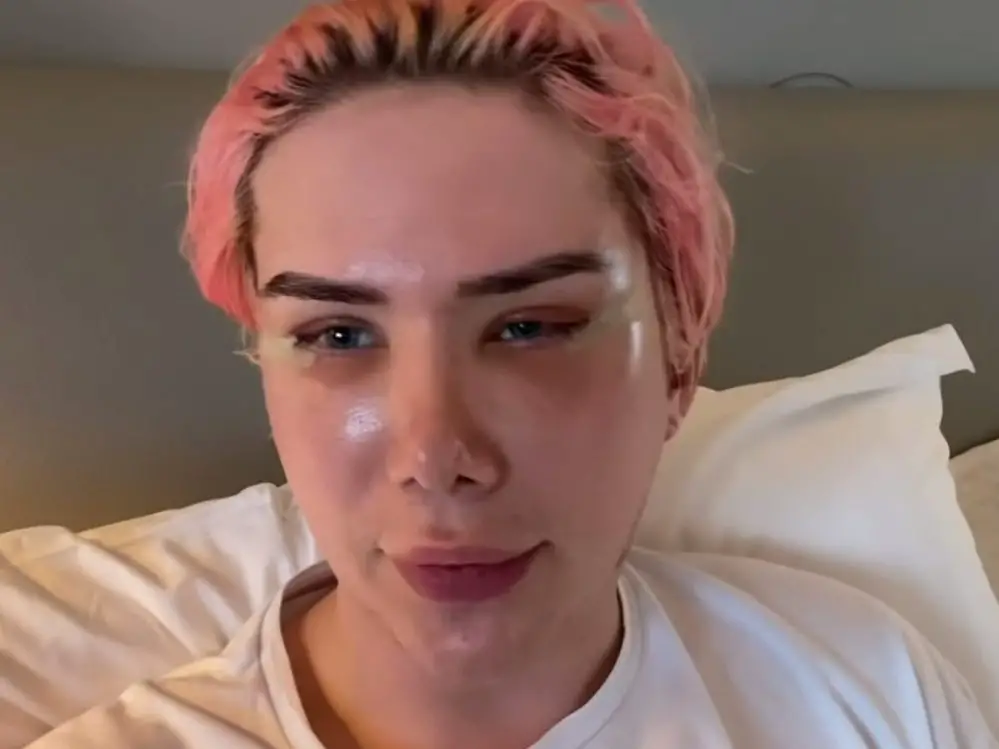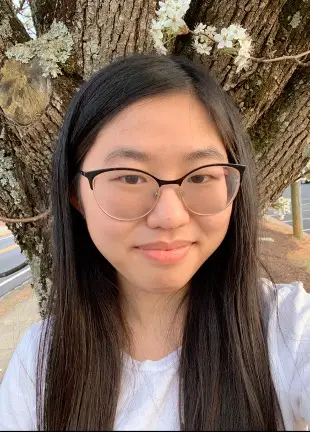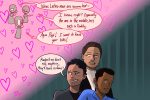Oli London, infamous among K-pop fans for their repeatedly obsessive behavior, has once again garnered the public’s attention in just about the worst way possible. London has spent over $240,000 on plastic surgery to emulate BTS’s Jimin Park, and after going through yet another round of plastic surgery, the British influencer revealed on June 19 over Twitter that they now identify as Korean. London later posted a video on June 26 doubling down on their newfound identity, stating “I look Korean and Korea is my home country.”
Some individuals have also taken the opportunity to profess their support, both sincerely and ironically. (People have also attempted to draw comparisons between being “transracial” and transgender, and while that conversation could be the subject of its own lengthy piece, others have already discussed it quite comprehensively elsewhere.)
In the end, however, few treated London’s claims as legitimate. Instead, those on social media largely decried their “coming out” as a form of cultural appropriation and a desperate bid for attention. Coming from a person who also married a cardboard cutout of Jimin and has been widely accused of being a “clout-chaser,” London doesn’t strike Korean netizens as someone who genuinely cares about either K-pop or South Korea, especially since they previously claimed that they had no interest in changing their ethnicity. But regardless of the authenticity of their feelings, this has opened up yet another conversation about what it means to be transracial.
What Does It Mean To Be Transracial?
Though originally coined to describe the unique experiences of those who were adopted by members of another race or culture, the word “transracial” has also become associated with people who claim to belong to a race other than that of their birth. Rachel Dolezal is an early and infamous example of this. Dolezal claimed to be a Black woman for years, going so far as to become president of the NAACP in Spokane and teach African studies, all while being of entirely white heritage. (She also joined ranks with the small group defending Oli London.)
Of course, race is indeed an extremely complicated and nebulous concept that many grapple with when trying to make sense of their identities. Race has no true scientific basis, and our understanding of who counts as what changes according to time and place.
Nevertheless, that doesn’t mean race is any less real when it comes to the way people interact with society, nor does it mean one’s ethnicity — which includes so many different facets of a person’s experiences and heritage — can be reduced to a handful of physical features or pop culture icons.
The Reduction of Korean Culture
It would be difficult to discuss Oli London without delving into the Korean wave, or Hallyu, which saw the spread of Korean pop culture across the globe. Thanks to streaming services and social media, it is easier than ever for people to consume foreign media and interact with others who share the same interests, and people are no longer limited to only enjoying the products of their own culture.
South Korea has proven particularly successful at exporting its cultural artifacts, if the popularity of K-pop and K-dramas are any indication. But an unfortunate side effect of Hallyu is the reduction of the Korean identity to something that non-Korean folk can pick up while it’s trendy (and discard when the mood strikes).
While sharing things like food, music and language are great ways to connect with and appreciate different cultures, cultural appropriation crosses the line of what is, well, appropriate. Admittedly, the line differs according to who you ask, but people can generally agree that a desire to look or even become Korean is a pretty weird notion. Although, that hasn’t stopped others (particularly “Koreaboos”) from expressing such sentiments online.
This strikes me as borderline fetishization, if not explicit fetishization. It’s another way of generalizing an entire group in service of some stereotypical fantasy that conflates entertainment with culture.
Furthermore, across multiple social media platforms like Tumblr and Twitter, posts frequently tout the supposed superiority of Korean men or cultural icons. This might seem flattering at first glance, but it ultimately reinforces pre-existing stereotypes and repeats orientalist tropes that depict East Asians as particularly exotic or talented.
London is particularly guilty of this in their fanatic idealization of Jimin as the “ideal man.” And, regardless of whether they did this for attention, London still pushed forward a racialized narrative surrounding Korean men.
There is an additional layer of hurt when the physical change that allows London to “finally” be Korean is the plastic surgery they went through to slant their eyes. Or, to borrow London’s words, “Korean eyes.” This is hardly a trait that any East Asian person would use to define their racial identity (except perhaps ironically) but that white or other non-Asian folk use to mock and degrade us. In fact, London’s entire approach to this new facet of their identity reminds me a little too much of yellowface and Asian-fishing, in which the same features that are the source of discrimination are co-opted by outside groups for cosmetic and entertainment purposes.
Appropriating “Transracial” Struggles
The focus on the superficial pursuit of the Korean look also disregards the fact that one’s ethnicity lies far beyond physical appearance alone. One’s ethnic identity is defined by the way the world perceives them, on top of the intergenerational cultural layers that inform one’s upbringing.
However, the two can’t always exist in perfect cohesion. Going back to the original definition of “transracial,” adoptees of an ethnicity different than that of their family face challenges related to assimilation, internalized racism and personal identity.
Kendra Rosati, a Korean adopted into a white American family, says she “constantly felt uncomfortable” and that her parents “didn’t know how to or want to talk about race” in an NPR interview. JS Lee, another Korean adoptee, writes about how she “was raised in racial isolation,” leading to her “fractured identity.”
These sentiments echo academic writings on the topic that discuss how a person’s perceived race shapes identity formation, adding an additional complexity to an already marginalized ethnicity.
In this manner, transnational adoptees, and even many immigrants, grapple with the feeling that they don’t truly belong to their ethnic group while simultaneously being viewed as a foreigner in the United States. When race and ethnicity are so intrinsically shaped by societal perception, this presents a genuine conflict between a person’s innermost feelings and outward appearance.
The same cannot be said for a person who comes from a place of privilege and happens to like another culture a little too much. London, who lacks the historical, racial and cultural baggage of ethnically Korean folk, has thus appropriated a word intended to describe the unique experiences of those who feel out of touch with their heritage and who lack the intergenerational connections that others of their ethnic group have.
But they’ve erroneously forgotten that there is no checklist of requirements that one can meet to belong to a different ethnicity. You simply are, or you aren’t, and it’s entirely dependent on a complex mix of social factors that isn’t limited to personal identification. To pretend otherwise reeks of entitlement and privilege. In this case, at least, London would do a better job of proving their affection toward Korean culture if they could just leave it well enough alone.

















